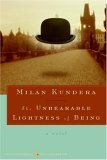The Unbearable Lightness of Being by Milan Kundera
 I'm on one of my "read-the-classics" kicks again. So I have decided to read a couple of novels that have been classified as some as classics. My catch is that when I read more than one book at a time they have to cover completely different subject matter. I have achieved that with the latest books: "The Unbearable Lightness of Being" by Milan Kundera and "In Cold Blood" by Truman Capote. I have not yet finished "In Cold Blood," but now you know what to expect as my next review.
I'm on one of my "read-the-classics" kicks again. So I have decided to read a couple of novels that have been classified as some as classics. My catch is that when I read more than one book at a time they have to cover completely different subject matter. I have achieved that with the latest books: "The Unbearable Lightness of Being" by Milan Kundera and "In Cold Blood" by Truman Capote. I have not yet finished "In Cold Blood," but now you know what to expect as my next review."The Unbearable Lightness of Being" is a political/social/philosophical novel that at first seems like it's going to be a romance novel / erotica, but in fact turns out to be a great summary of the Russian invasion of Checzoslovakia in 1968 an goes on to cover some philosophical issues including the great question; "What is the meaning of life?"
The first section of the book introduces the 3 "main" characters, Tomas, Tereza and Sabina. Tomas is a surgeon that has just gone through a terrible divorce in which his wife refuses to let him see his son so he decides to wash his hands of them. In doing so his parents wash their hands of Tomas. Tomas pretty much then sees women not as objects to love but as sexual beings. He maintains a relationship with artist Sabina while what could be called falling in love with Tereza. Tereza is from a small town outside of Prague and wants to be the sole receiver of attention of Tomas.
Tomas attempts to practice a philosophy of lightness. He considers sex and love two separate and unrelated entities; he sleeps with many women, and loves one woman (Tereza), and sees no problem with the simultaneous existence of these two activities. Accepting the lightness of being means accepting a certain lack of ultimate meaning in life, and living for momentary beauty. Those who accept lightness, for example, are not likely to ally themselves to political parties, either the Communist regime or the diehard dissidents.
Tereza worships books, culture, and kindness. Identifying Tomas as a kindred spirit and outsider, she falls in love instantly and permanently. In Prague, Tomas's womanizing drives Tereza to the brink of insanity. Although she attempts to understand her husband and his lifestyle and cannot argue with him logically, Tereza is unable to be "light" about her love or sexuality. She finds some fulfillment in her work as photographer, especially during the Soviet tank occupation; she does dangerous and politically dissident work as a photojournalist.
Sabina betrays, successively, her father's home, her art school, her lovers, and ultimately her country. Sabina is as beautiful and original as her artwork; early in life, she identified kitsch, or bad, sentimental, insistently sunny propaganda art, and lives her life as an attack on kitsch. She cares deeply for both Tomas and Tereza, even if she cannot understand why Tomas would trade his freedom for domesticity. Ultimately her desire for freedom leads Sabina to leave her love, Franz, and lose all contact with her past. Sabina is the "lightest" character in the novel, although none of the characters ever achieve the extreme lightness.
Toward the end of the novel the writer steps out of the story and discusses thoughts such as kitsch, communism and love. At these moments the book becomes less of a novel and more like an essay on life.
If you are a person who likes a good thought provoking novel mixed with some philosophy this one is for you. This is not a light read, but well worth the time.
If you're interested in reading the book I'll be posting it at Paperback Swap.
Swap Your Paperback Books - PaperBackSwap.com

Or you can purchase it by clicking here:
http://astore.amazon.com/giltsbluesstuff
posted by Gil T. @ 8:00 PM Comments: 0






























